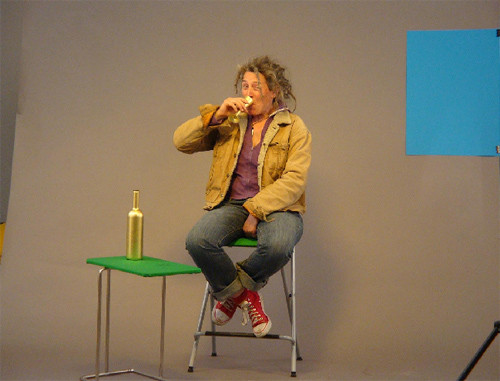On Joy, Sadness and Desire
09 May - 28 Jun 2009
ON JOY, SADNESS AND DESIRE
2009-05-09 until 2009-06-28
The exhibition ‘On Joy, Sadness and Desire’ is part of the manifestation ‘My Name is Spinoza’. The manifestation encompasses a contemporary reflection regarding the ideas of the philosopher Spinoza (1632-1677) that aims to pivot a discussion around his central thematics. The distinct relevance of Holland’s most renowned Enlightenment thinker is eminent: Spinoza’s work contains subject matter that govern the current-day public and political debate in The Netherlands, topics such as the freedom of speech, the correlation between citizens and state, religion and the public sphere. ‘On Joy, Sadness and Desire’ notably invokes these subjects; the exhibition moves beyond the talk of the day and investigates reason and passions as faculties that are intrinsically a part of being human. Therefore the works of art do not only refer to the public and political realm (some pieces are exhibited in the public sphere) but also represent thoughts and feelings that are experienced on an individual and deeply personal level. The Enlightenment elevated reason as ‘the most noble of human faculties’ and the primary source and legitimacy for authority. However, as Spinoza pointed out in his famous work ‘Ethics’ (1677), the human psyche is also ruled by desire and other passions. Before he concludes his book by stating that the path to attainable happiness revolves around the outlines of reason, he argues how people are often incapable of being consistently rational or even lucid – human beings are habitually engulfed in the powerful surge of tumultuous desire and impulse. Here Spinoza distinguishes three key sensations, joy, sadness and desire, from which all other emotions emanate. Spinoza did not pronounce emotions as harmful or destructive per se, but called them bad when they frustrate our striving or decrease our activity and power. Eliminating these disruptive passions contributes to our freedom because it prevents us from being directed by external forces. In the ‘Ethics’ he suggests certain principles that could liberate us from the constraints of bad passions. In the light of Spinoza’s work, one could argue that reason and passion are equally important to the attainment of knowledge and in unison play an important role in the enforcement of personal and social change. Hence a good liaison between sense and sensibility is indispensable for leading a good life, both as an individual and as a society at large. ’On Joy, Sadness and Desire’ presents work from seven artists who investigate into this complicated relation.
2009-05-09 until 2009-06-28
The exhibition ‘On Joy, Sadness and Desire’ is part of the manifestation ‘My Name is Spinoza’. The manifestation encompasses a contemporary reflection regarding the ideas of the philosopher Spinoza (1632-1677) that aims to pivot a discussion around his central thematics. The distinct relevance of Holland’s most renowned Enlightenment thinker is eminent: Spinoza’s work contains subject matter that govern the current-day public and political debate in The Netherlands, topics such as the freedom of speech, the correlation between citizens and state, religion and the public sphere. ‘On Joy, Sadness and Desire’ notably invokes these subjects; the exhibition moves beyond the talk of the day and investigates reason and passions as faculties that are intrinsically a part of being human. Therefore the works of art do not only refer to the public and political realm (some pieces are exhibited in the public sphere) but also represent thoughts and feelings that are experienced on an individual and deeply personal level. The Enlightenment elevated reason as ‘the most noble of human faculties’ and the primary source and legitimacy for authority. However, as Spinoza pointed out in his famous work ‘Ethics’ (1677), the human psyche is also ruled by desire and other passions. Before he concludes his book by stating that the path to attainable happiness revolves around the outlines of reason, he argues how people are often incapable of being consistently rational or even lucid – human beings are habitually engulfed in the powerful surge of tumultuous desire and impulse. Here Spinoza distinguishes three key sensations, joy, sadness and desire, from which all other emotions emanate. Spinoza did not pronounce emotions as harmful or destructive per se, but called them bad when they frustrate our striving or decrease our activity and power. Eliminating these disruptive passions contributes to our freedom because it prevents us from being directed by external forces. In the ‘Ethics’ he suggests certain principles that could liberate us from the constraints of bad passions. In the light of Spinoza’s work, one could argue that reason and passion are equally important to the attainment of knowledge and in unison play an important role in the enforcement of personal and social change. Hence a good liaison between sense and sensibility is indispensable for leading a good life, both as an individual and as a society at large. ’On Joy, Sadness and Desire’ presents work from seven artists who investigate into this complicated relation.

